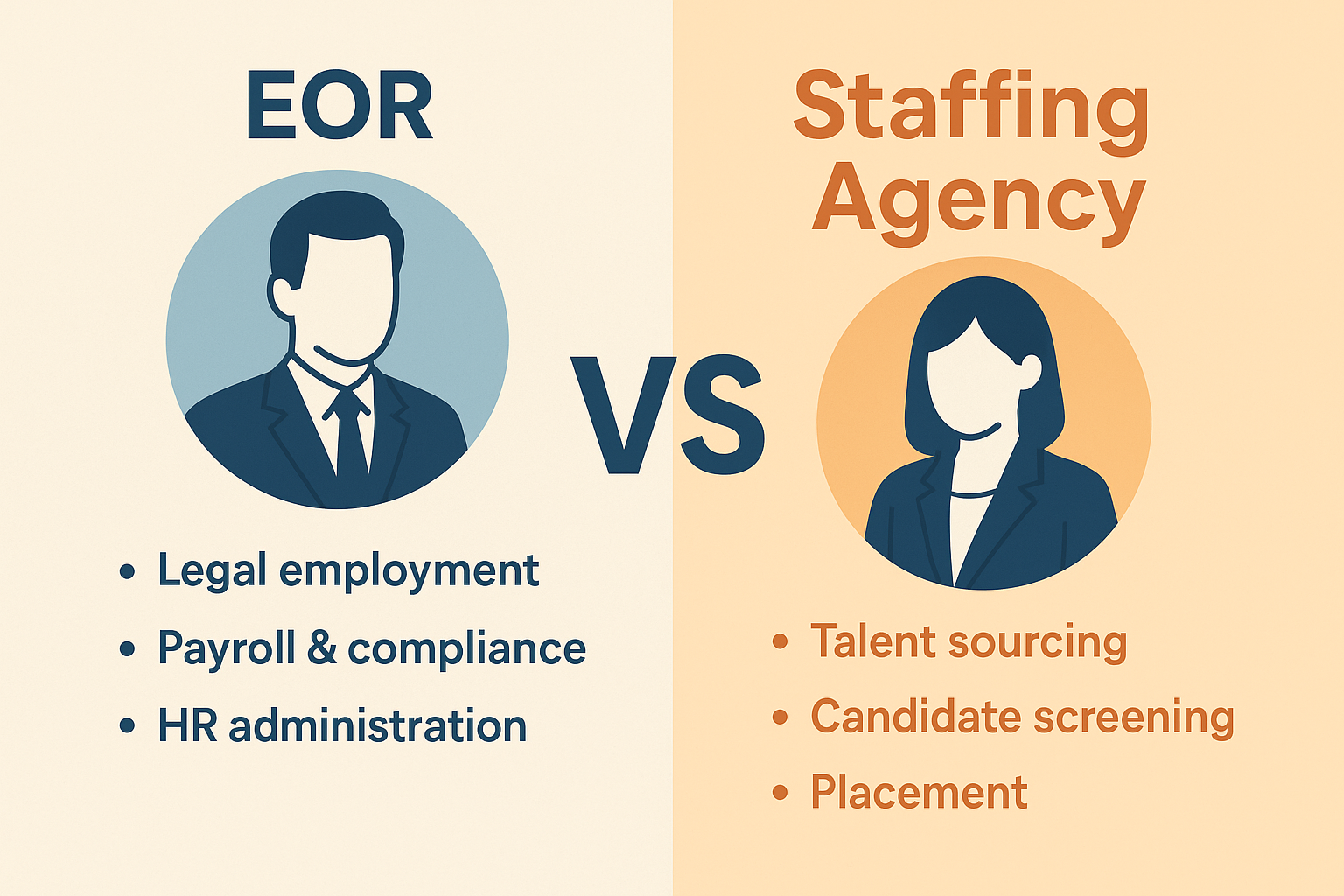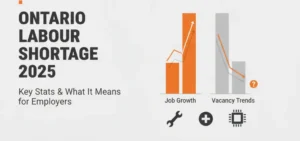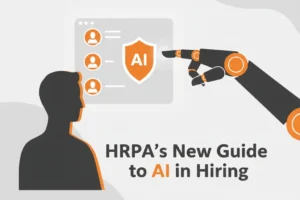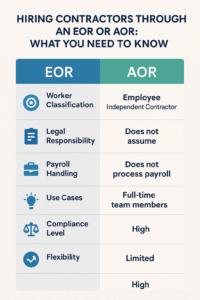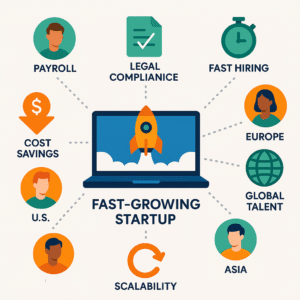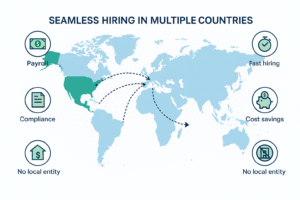Hiring internationally or even locally can involve various partners and models. Two common services are Employer of Record (EOR) providers and staffing agencies. If your company is looking to expand your team across borders, you might wonder: “Do I need an EOR or a staffing agency, or both? What’s the difference?” While an EOR and a staffing agency can complement each other, they serve distinct roles in the hiring process.
In this article, we’ll clarify the differences between an EOR and a staffing agency, with a focus on global hiring scenarios. By understanding their unique functions – EORs handling legal employment and compliance, and staffing agencies focusing on talent sourcing – you can determine which solution (or combination) fits your needs. We’ll cover how each works, their benefits and limitations, and practical examples of when to use one versus the other. If you’re aiming to hire talent internationally without setting up foreign entities, or trying to decide the best way to find and employ candidates, read on for the key insights.
What Does a Staffing Agency Do?
A staffing agency (also known as a recruitment agency, employment agency, or temp agency depending on context) is a firm that helps companies find and recruit workers. Essentially, staffing agencies are in the business of talent acquisition. They maintain pools of candidates or actively source new candidates to fill roles requested by their client companies.
There are a few different models of how staffing agencies operate:
- Recruitment/Placement Agency: In this model, the agency finds candidates for a permanent position at the client’s company. The client hires the candidate directly (becomes their employer) after paying the agency a placement fee (often a percentage of the annual salary). Once placed, the agency’s role is done.
- Temporary Staffing / Contract Staffing: Here, the agency provides workers on a temporary basis. The workers are often employees of the staffing agency or engaged by the agency, and are “assigned” to work at the client company for a period. The client pays the agency, and the agency pays the worker (often with a markup). This is common for seasonal work, temp office staff, IT contractors, etc. In this scenario, the staffing agency is actually acting as an employer (for the duration of the assignment), but only in a limited sense for those temp workers and typically handling payroll for them.
- Staff Augmentation firms / Consulting firms: These are similar to temp staffing but often for highly skilled roles (like IT consultants) – the concept is the same that the firm provides people to work on the client’s projects.
For our discussion, the main point is staffing agencies focus on sourcing and supplying human resources, whereas EORs focus on legally employing and administering human resources.
Key responsibilities of a staffing agency:
- Understand the client’s talent needs (job requirements, number of workers, duration, etc.).
- Source candidates via job postings, databases, networking, etc.
- Screen and interview candidates to create a shortlist for the client.
- Coordinate interviews between candidates and the client hiring managers.
- Assist in the hiring process – some agencies also help negotiate offers or contracts.
- For temp placements: handle the employment paperwork for the temp worker, provide payroll to them (often weekly/hourly pay), manage timesheets, etc., and deal with any replacement if someone doesn’t work out.
A staffing agency is all about finding the right people. They are typically experts in recruitment, often specializing in certain industries or job types. For example, you might have an IT staffing agency, or one that provides warehouse labor, or one that staffs administrative assistants.
In the global context, some staffing agencies operate internationally or have networks in multiple countries. For instance, a global staffing firm could help you find candidates in different countries, but when it comes to actually hiring those candidates, the agency might either employ them (if temp) or you might hire them directly. This is where an EOR could come into play alongside a staffing agency.
What Does an Employer of Record (EOR) Do? (Recap)
We’ve covered EORs in detail earlier, but to recap briefly in context: an Employer of Record is a service that legally employs a worker on behalf of a client company. The EOR handles all the HR, payroll, tax, and compliance aspects for that worker. Unlike a staffing agency, an EOR is not primarily a recruiter; an EOR typically comes into the picture after you’ve found the candidate (or have an existing worker) that needs to be employed.
Think of it this way: If a staffing agency’s slogan is “We find you people,” an EOR’s slogan is “We hire and pay your people (legally).”
Responsibilities of an EOR include:
- Arranging a local employment contract for the employee (with the EOR’s local entity as the employer).
- Setting up payroll and paying the employee’s salary in local currency.
- Withholding and remitting taxes, social contributions, and any other mandatory payments.
- Providing statutory benefits (and sometimes additional benefits) to the employee.
- Ensuring compliance with labor laws (e.g., working hours, leave, termination rules).
- Handling administrative HR tasks like enrollment in pension or health insurance, expense reimbursements, and maintaining employment records.
- Advising on local employment practices as needed (like recommended benefits or notice periods).
An EOR does not typically source candidates or decide who to hire – that’s your job as the client or perhaps the staffing agency’s job if you use one. Instead, the EOR’s job begins once you have a person you want to bring on board and you need a way to legally employ them, especially if in a country/state where you don’t have a presence. For example, if you identify a great candidate in Italy but you don’t have an Italian company, an EOR can step in to employ that person for you in Italy. If you had a staffing agency find that Italian candidate for you, the EOR then takes over the employment part.
EOR vs Staffing Agency: How They Differ
Now let’s highlight the fundamental differences between an EOR and a staffing agency, especially from the perspective of global hiring:
- Stage of the Hiring Process: A staffing agency is involved at the beginning of the hiring process – finding and vetting candidates, essentially helping with recruitment. An EOR is involved at the end/after hiring – when it comes to onboarding and employing the person according to local lawsbroadleafresults.com. In fact, a Broadleaf HR article puts it succinctly: “An employer of record focuses on the tasks and liabilities that come towards the end of the hiring process, once an employment offer has been made and accepted. A staffing agency, on the other hand, is responsible for sourcing employees.”broadleafresults.com. This clearly delineates their roles.
- Nature of Service: Staffing = Talent provider. They provide you people (either for permanent hire or temp assignment). EOR = Legal employer. They provide you a compliant employment infrastructure. So an EOR will not find you a person you didn’t already identify (except some EOR companies have separate recruiting services, but that’s not inherent to EOR itself). Meanwhile, a staffing firm might not manage compliance beyond matching you with a candidate (unless it’s a temp situation).
- Legal Employer: In a staffing agency temp scenario, the staffing agency is often the employer of the worker, but usually only for a short term and specifically for the assignment. In a permanent placement scenario, the staffing agency never becomes the employer; your company does (they just facilitated the match). In an EOR scenario, the EOR is the employer for the entire duration of the employment, which could be indefinite/long-term. So, EOR is a long-term employer solution, whereas a staffing agency is either not the employer (permanent hire case) or a short-term employer (temp case).
- Duration and Continuity: Staffing agencies (temp): the workers might only be with you for a limited time (e.g., 3-month temp contract), after which they might leave or be reassigned by the agency to another client. EOR: typically used for ongoing employment as long as needed, could be years. (EORs can also handle short-term employments – they could payroll someone for 3 months – but it’s usually part of a longer strategy or at least for the project length. It’s not about shuffling people around to different clients; an EOR-employed worker usually works exclusively for your company until termination.)
- Expertise: Staffing agencies specialize in recruiting talent, understanding job requirements, and evaluating candidates. EORs specialize in HR compliance, labor regulations, and payroll across different jurisdictions. For example, an EOR will know how to register an employee in China’s social security system, while a staffing agency knows how to source and interview candidates with the skills you need.
- Global Reach Differences: If you need to hire globally, an EOR is almost essential for legal compliance if you don’t have entities. A global staffing agency can help you find candidates globally, but after finding, you still face the question “how do I employ this person?” If you use just a staffing agency for a permanent hire in another country, you would typically have to hire the person directly (requiring an entity or some arrangement). The staffing agency doesn’t solve that – they solve the sourcing. That’s why often companies will use a staffing agency in conjunction with an EOR for international hires. On the flip side, if you already have candidates (maybe through your own networking or referrals), you might skip staffing agencies entirely and just use an EOR to hire them.
- Cost Structure: Staffing agencies (permanent placement) usually charge a one-time fee (e.g., 15-25% of annual salary) for a successful hire. Temp staffing agencies charge an ongoing markup on the hourly rate of the temp (so you pay more per hour than the worker gets; the agency keeps the difference to cover their costs and profit). EORs charge an ongoing service fee (monthly per employee or % of payroll). If you compare EOR vs using a temp agency to employ someone, the pricing might differ. Temp agencies might mark up a lot to cover benefits and their margin. EORs usually charge a clear fee and you pay actual salary and benefits costs on top. If you just need compliance and not recruiting, an EOR could be more straightforward cost-wise.
- Commitment and Relationships: With a staffing agency, once a permanent hire is made, the agency steps out and you handle the employment. With an EOR, the EOR stays involved throughout the employment life cycle. If an issue arises (like performance or legal issue), with a staffing-placed employee (permanent), it’s your responsibility entirely. With an EOR-employed worker, the EOR would be involved in any disciplinary or termination process to ensure compliance.
- Target Roles: Staffing agencies can hire for any role depending on their focus, from entry-level temps to C-suite executives (executive search firms are essentially specialized staffing agencies). EORs, however, don’t target roles; they’ll employ whoever you need, be it a software engineer, a sales rep, etc. However, one point: If you’re hiring an independent contractor via an EOR to make them a compliant employee, that role might have been originally sourced by a staffing agency as a contractor. There is some overlap where EORs sometimes help companies convert contractors to employees for compliance (which staffing agencies usually wouldn’t do unless they themselves want to payroll the person as a temp).
- End of Employment: If a staffing agency temp finishes the assignment or is let go, the staffing agency handles any necessary termination pay (if any) as they’re the employer. If a EOR-employed worker is let go, the EOR handles the legal termination process (ensuring notice, severance, etc. per law). In a permanent hire through staffing, if things don’t work out and the person is fired, the staffing agency isn’t involved in that at all (though some agencies have a guarantee period where if a hire quits within X days they find a replacement at no fee). With an EOR, they will manage that offboarding properly.
In essence, staffing agencies focus on “WHO” and EORs focus on “HOW” (who to hire vs how to employ them compliantly).
For global hiring: Use a staffing agency when you need help finding talent in a country. Use an EOR when you need help employing talent in a country. They are not mutually exclusive – in fact, they often complement each other.
Benefits of Using a Staffing Agency
Why might a company use a staffing agency, especially in a foreign country or even locally?
- Access to Talent Pools: Staffing agencies often have a ready database of candidates and local market knowledge. If you’re hiring in a new country and lack networks there, an agency can quickly present qualified candidates.
- Speed: Recruiting can be time-consuming. Agencies have recruiters whose full-time job is to fill roles quickly. They can often short-circuit the timeline by presenting pre-screened candidates faster than if you start from scratch.
- Local Expertise in Hiring: The agency can advise on local salary expectations, job market conditions, and cultural fit considerations. For global hiring, this is valuable. For instance, if you’re hiring in Japan for the first time, a local staffing firm can guide you through what candidates expect and how to approach them.
- Flexibility (Temp Staffing): If you need contractors or short-term help, a staffing firm can provide temp workers without you having to make long-term commitments. The agency can scale the number of workers up or down as your needs change.
- Reduced Hiring Risk: For permanent placements, some agencies provide a guarantee (if the hire doesn’t work out in X months, they find a replacement without extra fee). For temp hires, since the workers are technically the agency’s employees, if someone is not a fit, you can ask the agency for a replacement, and you typically don’t handle the firing paperwork – the agency does. This reduces the risk and hassle for you.
- Outsourced HR for Contractors: If you use temp workers via an agency, they handle all the payroll and compliance for those workers (but note: only for the duration those workers are on their payroll under assignment). This is similar to an EOR function but usually limited to those specific assignments.
- Focus on Core Business: By letting an agency recruit or provide temp staff, your team can focus on core work instead of sifting through resumes or handling short-term payroll.
- Trial to Hire: Sometimes companies use a temp-to-perm model via staffing agencies. They take someone on as a temp (employee of the agency) for a few months to assess, and if the person is great, they then hire them permanently (potentially paying a conversion fee). This “try before you buy” approach can be beneficial.
Benefits of Using an EOR (versus Staffing for Employment)
We’ve discussed EOR benefits previously, but in contrast to using a staffing firm for employing someone, here are reasons to use an EOR:
- Compliance for Long-Term Employment: If you find a great candidate yourself, an EOR lets you employ them legally in their country indefinitely. A staffing agency might only put them on payroll as a contractor temporarily, but if you want them as a permanent team member for years, EOR is designed for that.
- No Local Entity Required: An EOR allows you to hire in countries where you have no entity without misclassifying the worker. A staffing agency might require you to eventually take over the hire under your own entity if permanent. EOR solves that by being the ongoing employer.
- Full HR Compliance and Support: EOR ensures all local laws (taxes, insurance, leave) are followed for that employee. While a staffing agency handling a temp will also follow laws, an EOR goes further for permanent employment aspects like pension contributions, statutory bonuses, etc., for the long haul.
- Employee Loyalty and Benefits: With an EOR, the employee is typically treated as a regular employee with full benefits. If you keep someone as a contractor through an agency long-term, they might miss out on certain benefits or feel less a part of your company. EOR employees, although employed by the EOR, often receive standard benefits and you can integrate them into your company culture as a dedicated team member.
- Simplified Multi-Country Solution: If you are hiring in multiple countries, instead of dealing with different staffing agencies in each country and their different arrangements, you could partner with one global EOR provider to handle employment for all your international hires. This single-point solution is simpler to manage administratively.
- Avoiding Co-Employment/PEO issues for international: In some cases, companies use domestic staffing agencies to payroll people in another state to avoid registering there. But if you scaled, that’s not sustainable. EOR is a cleaner solution for cross-border employment than patchworking through staffing firms.
- Continuous Service: EOR is not limited to project duration. If you want the person working for you for the foreseeable future, an EOR is committed to that. A staffing agency might not be as geared towards indefinite employment unless they convert the person to your direct hire (which again leads you to needing an entity or an EOR anyway).
- Risk Mitigation: The EOR assumes the legal risk of employment compliance. If something happens like a labor dispute, the EOR handles it. With a direct hire (post-staffing placement), you’d handle it. With a staffing temp, they handle it while the person is temp, but if you want to keep that person permanently, you eventually hold the risk unless you move to an EOR or hire them direct.
When to Use a Staffing Agency vs When to Use an EOR
Use a Staffing Agency if:
- You need help finding or attracting candidates, especially in a domain or location where you lack expertise or network.
- You have a short-term project or surge in workload and need temporary staff quickly (e.g., a 3-month data entry project, a maternity leave cover, a seasonal peak).
- You want to “test out” a role with a temp-to-perm approach.
- You are hiring locally (or in a country where you operate) and just need to outsource recruiting.
- You need to hire a lot of people quickly in a certain location – agencies can deploy multiple recruiters to fill many roles.
- The roles are relatively common or defined such that agencies likely have candidates (agencies excel with roles they specialize in; niche roles might require specialized agencies).
- You want to outsource the initial vetting of candidates to save your internal team’s time.
EOR if:
- You have already identified a candidate (or several) in a country where you don’t have a legal entity and need to legally employ them.
- You’re expanding globally and want to avoid setting up entities for a small number of employees.
- You want the person as a dedicated team member for your company, not rotating through as an agency temp. They will essentially be a regular employee (through EOR) rather than one of many temps.
- Compliance risk is a concern – for example, you’ve been working with an independent contractor abroad and realize it’s risky; using an EOR to convert them to an employee mitigates that risk.
- You already have candidates from either your own efforts or maybe from a staffing agency’s search, and now you need to handle ongoing employment for them internationally.
- You want a long-term HR partner in the country to manage payroll, taxes, and HR matters as you possibly grow a team there (without immediately incorporating).
- The location has complex labor laws and you prefer an expert handle employment to avoid mistakes.
Both (Agency + EOR) if:
- You need to hire abroad and don’t know any candidates (so you use a staffing/recruiting agency to find talent), and once you pick the candidate, you use an EOR to employ them because you have no entity there. This combination is common in global hiring. For example, you might hire a marketing manager in Brazil by using a Brazilian recruiting firm to find 3 good candidates, choose one, then use an EOR provider in Brazil to put that person on payroll and employ them for you.
- You need to quickly staff an overseas project with 5 contractors for 6 months – you could use an agency to get the contractors and either let the agency payroll them (if they offer that via their temp service) or use an EOR if you want to ensure certain compliance or possibly keep some on longer.
- You have ongoing recruiting needs in one country and plan to hire multiple people; you might work with a staffing firm continuously for candidates but use the same EOR for each hire’s employment.
Example Scenario
Suppose your company, based in the US, wants to establish a customer support presence in Latin America to cover Spanish-speaking clients. You decide to hire 3 support agents in Mexico.
- Option 1: You hire a Mexican staffing agency to find the candidates and also employ them as contractors. The agency finds 3 great people and hires them as temps assigned to you. This works, but the workers see the agency as their employer (with potentially less connection to your company), and the arrangement might be meant for shorter-term (though some agencies will keep renewing contracts). If later you want those people to be truly part of your company culture long-term, you may eventually need to open a Mexican entity to hire them directly, or transition to an EOR.
- Option 2: You directly use a global EOR provider in Mexico. They don’t find candidates, so you either find candidates via job ads or hire a recruiter (maybe even a contract recruiter or agency just for sourcing). Once you identify your 3 hires, the EOR employs them. Now those support agents are employees of the EOR but working for you. They get all local benefits, and you manage them day-to-day. If one leaves, you find a replacement (or you could again ask a staffing agency to help find a replacement) and then onboard them via EOR.
- Option 3: Use both: a staffing agency finds the talent, then you transfer the employment to an EOR for the ongoing job. You pay the agency a placement fee for each hire, and then pay the EOR monthly for employing them. This way, you leveraged recruiting help and have a solid employment setup.
For a short term need, say you just need one person in Mexico for a 3-month project: you might lean toward a staffing agency to provide a contractor, since the hassle of setting up an EOR for just 3 months vs letting an agency handle a short assignment might not be worth it. But if it might extend or if compliance is tricky, EOR could still be safer even for short stints.
Conclusion
Staffing agencies and EORs serve different but complementary functions in the hiring process. If you think of hiring in two parts – finding talent and employing talent – a staffing agency helps with the finding, and an EOR helps with the employing (especially when employing in foreign jurisdictions).
For global hiring, you will often need an EOR to handle compliance once you pick candidates, whereas staffing agencies are optional but useful if you don’t have recruiting capability in that locale. For domestic hiring, if you already have an entity and HR, you might only use staffing agencies for recruiting help; EOR wouldn’t be needed unless maybe you want to payroll a short-term person via an outside company (which could also be done by a temp agency).
In summary:
- Use staffing agencies to get the right people on board; use an EOR to get them on payroll and compliant.
- Staffing agencies = hiring matchmakers; EORs = employment facilitators.
Understanding these differences will help you craft an efficient global hiring strategy. You might engage a network of recruiters or agencies to source talent worldwide, and partner with a trusted EOR provider (like Divino Business Solutions or our affiliates) to handle the legal employment in each location. By doing so, you combine the strengths of both and mitigate the weaknesses. The staffing agency ensures you have quality candidates; the EOR ensures those candidates can work for you legally and smoothly.
At Divino Business Solutions, we can assist with both sides of this equation. We offer recruitment services and have staffing expertise in Canada, and through our partners can help globally. We also provide EOR services in Canada and coordinate EOR solutions globally. Our goal is to make your global hiring hassle-free from sourcing to onboarding.
If you’re planning to grow your team internationally (or even locally) and are unsure about the best approach, get in touch with us. We’ll help you find the talent you need and ensure they’re hired in full compliance – essentially, you can “leave your hiring to us and we’ll take it from there.” With Divino, you gain both the recruiter’s eye and the HR compliance shield, so you can focus on integrating your new team members and driving your business forward.
FAQs: EOR vs Staffing Agency
Q: Is an Employer of Record a staffing agency?
A: No, an Employer of Record (EOR) is not a staffing agency, though people sometimes mix them up. An EOR does not find you candidates or do recruitment. Instead, an EOR becomes the legal employer of your chosen candidate and handles payroll, taxes, and compliance for that personbroadleafresults.com. A staffing agency, on the other hand, finds and supplies candidates for open positions, and may or may not be their employer depending on the arrangement. Think of it this way: a staffing agency answers the question “Who will do the work?” while an EOR answers “How will we legally employ the person doing the work?” They serve different stages of hiring.
Q: Can a staffing agency help with international hiring?
A: Yes, staffing agencies can help source candidates internationally, especially large global agencies or local agencies in the target country. They can identify talent, conduct initial interviews, and present candidates. However, once you choose a candidate in another country, you’ll still need to figure out how to employ them. Some big staffing firms offer their own “employer of record” services for contract placements, but often companies will use a dedicated EOR provider for the employment part. In short, a staffing agency can find you the person overseas, but to actually hire that person compliantly you may use an EOR (unless you have a local entity or the staffing firm itself acts as the temp employer for a short term). Many companies use the combination of local recruiters + EOR for global hiring.
Q: What are the cost differences between using a staffing agency and an EOR?
A: They have different cost structures. A staffing agency (permanent hire) typically charges a one-time recruitment fee (e.g., 15-20% of the annual salary) when the candidate is hired. A staffing agency (temp/contract) will charge an ongoing markup on the worker’s hourly rate (for example, you pay the agency $50/hour, the worker gets $40/hour, and the agency keeps $10). An EOR usually charges a fixed monthly fee per employee or a percentage of the payroll as an ongoing cost. For example, an EOR might charge $500 per month per employee for their service. So, if you use an agency to find someone and then an EOR to employ them, you pay both: the one-time agency fee plus the ongoing EOR fee (and of course the salary itself). If you bypass an agency (find the person yourself), you save the recruitment fee but might invest more internal effort. If you bypass an EOR (by using the agency’s temp service to employ someone), the agency’s markup will include their admin costs and profit – sometimes that markup might be higher or lower than an EOR fee depending on the case. Generally, use the agency for what it’s best at (finding talent) and the EOR for what it’s best at (employment), and consider the fees as part of the cost of global hiring. Make sure to get transparent quotes: agencies should clarify their fees, and EORs will outline their pricing. Often, companies find that paying a recruitment fee is worth getting a great hire, and paying an EOR fee is worth staying compliant – compared to the cost of doing it wrong (bad hire or compliance fine, respectively).
Q: If I hire a contractor through a staffing agency, do I still need an EOR?
A: If the contractor is going to remain employed by the staffing agency (as a temp) for the duration of their work, then you wouldn’t need a separate EOR for that individual – the staffing agency in that case is handling the employment (they are effectively acting as the employer of record during the contract). This is a common model for short-term needs. However, consider a few things: Staffing agency contractors are often meant to be short-term or project-based. If your contractor’s engagement extends long-term, you might end up paying a high markup continuously, and there could be co-employment concerns depending on local laws. In some cases, companies after a while decide to bring the contractor on as a direct employee (to reduce cost or integrate them more). At that point, if you don’t have a local entity, you’d need an EOR to transition them onto. Additionally, staffing agencies might only operate in certain countries – if you contracted someone in a country via an agency not authorized there, that could be an issue. So, for a pure short-term contract, using the agency alone is fine. For a long-term or open-ended role, you might eventually switch to an EOR model for stability and potentially lower cost. Always ensure the arrangement (agency vs EOR) fits the intended tenure and integration of the worker.
Q: Do EOR providers also offer recruiting services?
A: Some do, but many EOR providers stick to employment compliance and don’t recruit. However, many EOR companies partner with recruiting firms or have a network of talent sources they can refer you to. A few larger global workforce solutions companies brand themselves as offering “end-to-end” service, which includes a bit of everything (often through divisions or partners – for example, they might have a recruitment wing and an EOR wing). Divino Business Solutions, for instance, offers recruiting as a service and EOR as a service, but these are distinct functions. If you find an EOR provider that also promises recruiting, clarify if it’s their core competency or an add-on. In some cases, using a specialist (specialist recruiters for hiring, specialist EOR for employment) ensures each part is handled by experts. The good news is you can mix providers – you don’t have to get everything from one place. You can use a local headhunter agency for recruiting and a different company for EOR. The key is that they coordinate well during the handoff (which is usually straightforward). In short, while a few providers might do both, it’s common to use separate experts for recruiting and for EOR.
Q: What if I already have a candidate – should I still involve a staffing agency or just the EOR?
A: If you already have identified a candidate (or multiple candidates) that you want to hire, you likely don’t need a staffing agency for that hire since the hard part of sourcing is done. You can go straight to employing them. If this candidate is in a location where you don’t have an entity, then engaging an EOR is the straightforward way to bring them on board legally. The EOR will handle issuing the contract, setting up payroll, etc. The staffing agency doesn’t need to be involved if you don’t need recruitment help. The only exception might be if the candidate was initially presented by a staffing agency or recruiter (for example, maybe a recruiter introduced you to this candidate months ago), then ethically and contractually, you might owe that recruiter a fee if you hire the person. Barring that scenario, you can proceed with an EOR and no staffing agency. In fact, this is a common path: companies find candidates through referrals, LinkedIn, etc., and then just use EOR for employment. Of course, if you foresee needing more candidates or want to build a pipeline, you might separately engage a staffing agency or recruiting firm for those additional roles while still using EOR for each hire’s employment.
Q: Can staffing agencies and EORs work together?
A: Absolutely, and they often do. Many of our clients at Divino, for example, use our recruiting services to find talent and our EOR services to employ them (working together seamlessly). Even across different firms, coordination is common – the staffing agency finds the person and once the client is ready to hire, the EOR provider takes over the HR onboarding. They just need to align on timing and info (e.g., the EOR will need the candidate’s details, salary, etc., from the hiring process). There’s usually no conflict because their roles are sequential and complementary. From the company’s perspective, it feels like an integrated process: first the recruiter delivered candidates, you chose one, then the EOR onboarded them and now they’re working. So yes, staffing agencies and EORs can definitely collaborate, and a good EOR provider will have no issue working with a third-party recruiter you’ve used, and vice versa. The end goal for both is a happy client with a great employee in place.
Check out how to simplify recruitment or The Bias of Interviews: Are You Just Hiring a Smile?
Sources:
broadleafresults.com Broadleaf Results – EOR vs Staffing Agency difference: “An employer of record focuses on tasks and liabilities at the end of the hiring process… A staffing agency… is responsible for sourcing employees.”
globalization-partners.com Globalization Partners – Describes that an EOR serves as legal employer handling life cycle and compliance, while a staffing agency connects employers with qualified candidates.
remotelytalents.com RemotelyTalents – Emphasizes that while EORs handle legal/admin aspects, staffing agencies focus on sourcing and vetting candidates (front-end of hiring).
remote.com Remote.com – Explains EOR features (legal employer, payroll, compliance) which contrasts with an agency’s recruiting role.
globalization-partners.com Globalization Partners – “Unlike an EOR or PEO solution, standard umbrella companies do not handle tasks like onboarding, legal guidance, or labor law compliance…” (related context: umbrella vs EOR, showing not all providers handle compliance – relevant to understanding roles, though umbrella is more contractor-focused.)
